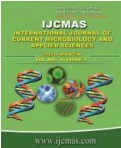


 National Academy of Agricultural Sciences (NAAS)
National Academy of Agricultural Sciences (NAAS)

|
PRINT ISSN : 2319-7692
Online ISSN : 2319-7706 Issues : 12 per year Publisher : Excellent Publishers Email : editorijcmas@gmail.com / submit@ijcmas.com Editor-in-chief: Dr.M.Prakash Index Copernicus ICV 2018: 95.39 NAAS RATING 2020: 5.38 |
A field experiment was carried out in Factorial Randomized Block Design (FRBD) with three replications to assess the thermotolerance in wheat varieties when grown under timely and late sown conditions and to study the biochemical parameters of grains as also their relationship with grain yield. Nine different wheat varieties viz., GW 433, GW 431, HI 1571, GW 432, RAJ 3765, HD 2864, HI 1563, HD 3091 and PBW 670 sown in timely and late sown conditions (i.e., 22 November and 6 December 2012) were included in the study. Late sown varieties were exposed to 32.40C and 33.9-35.30C temperature during flowering and grain filling period as against 29.40C and 30.3-33.30C temperature faced by timely sown wheat. Grain yield was reduced under late sown condition as compared to timely sown wheat. Considering the yield reduction, variety HI 1571 exhibited the least reduction (1.73%), followed by GW 433(7.90%) and GW 431 (13.8%) under late sown condition, whereas variety PBW 670 recorded maximum grain yield reduction (29.41%). Gluten content exhibited significant correlation with grain yield but in negative direction. Protein contributed negatively to grain yield whereas, there was non-significant positive correlation between starch and grain yield. The varieties HI 1571, GW 433 and GW 431 could be considered as thermo-tolerant varieties in view of the least reduction in their grain yield under late sown condition. The varieties HI 1571, GW 433 had highest gluten content and GW 433 additionally exhibited high protein as well as starch content under late sown condition,
 |
 |
 |
 |
 |